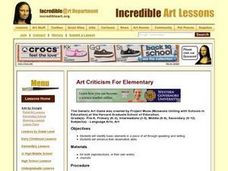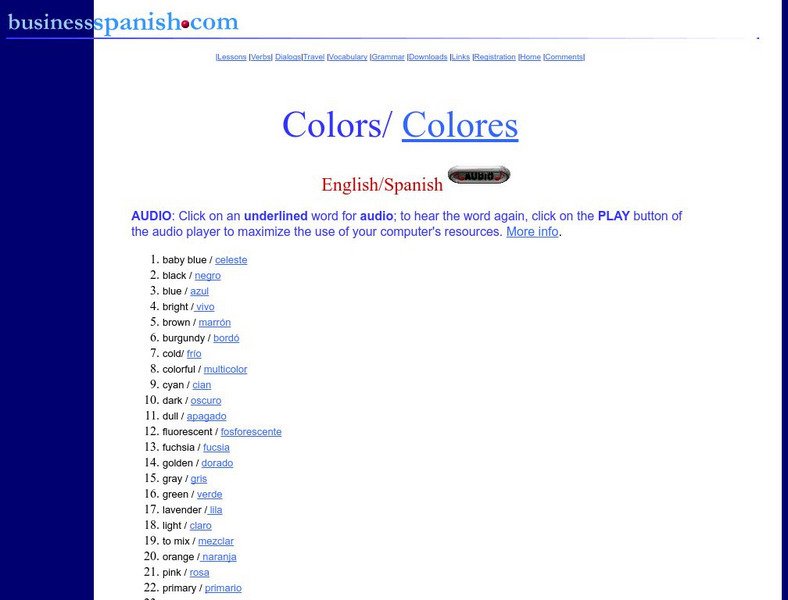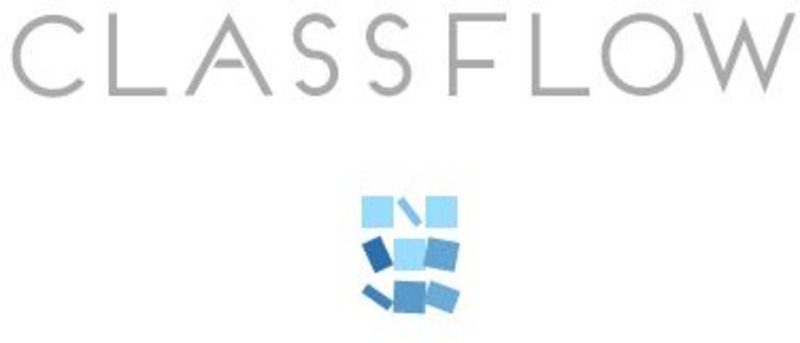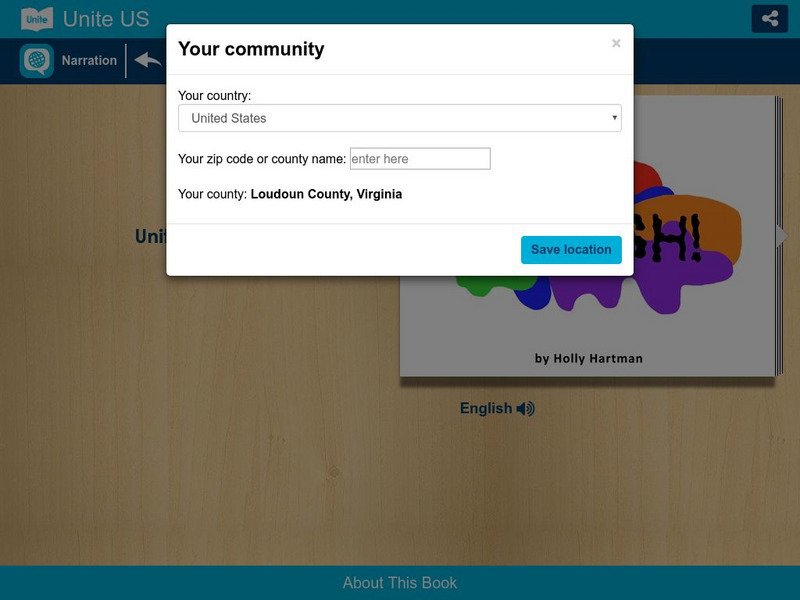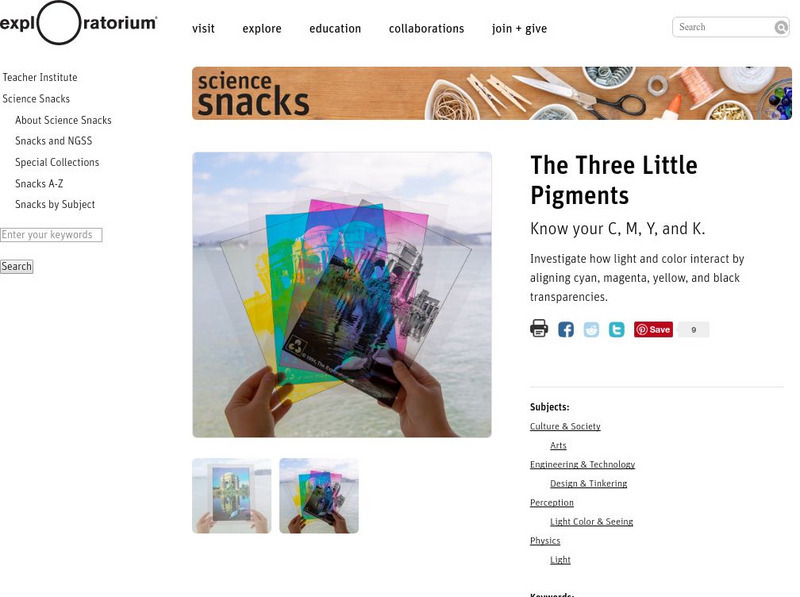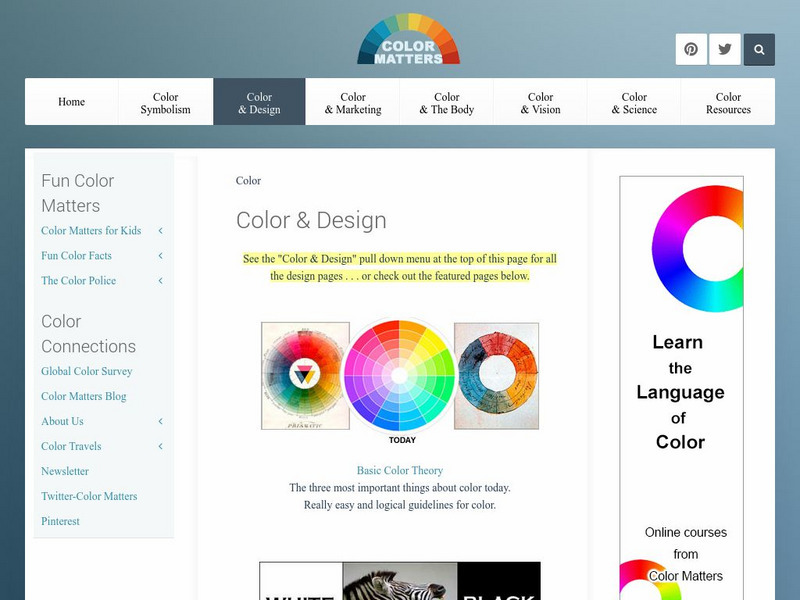Curated OER
Where is Everybody?
Students collect data from different grade levels at their school and develop thematic maps which show population density, and determine how this might affect the school and themselves in the future.
Curated OER
HALLOWEEN - HOLIDAY FINE ARTS ACTIVITIES
The pupils will demonstrate their understanding of crescendo; to achieve dramatic effect in singing the Halloween Song (basic technique used to provide mood in Music).
Curated OER
Halloween Fine Arts Activities
Third graders demonstrate their understanding of crescendo. They achieve dramatic effect in singing the Halloween Song. They sing this song with a gradual crescendo from beginning to end.
Curated OER
Leaf Stencil Design
Students design a pattern from a single shape and use overlapping to create color blends. They experiment with the effects of using a stencil.
Curated OER
Introduction to African Folklore
Students are read "Anansi the Spider" to begin their discussion on continents. Using a map, they locate the continent of Africa and the country of Ghana. They discover who the Ashanti people are and view examples of their artwork. They...
Curated OER
Quick and Easy Tie-Dye
Pupils create their own tie-dye shirts. In this visual arts lesson plan, students take shirts and wrap a rubber band around a few small areas. They dot these areas with sharpies and then blend them together with rubbing alcohol.
Curated OER
Group Foraging
Students explore co-operation by researching ocean life. In this fish science lesson, students identify many vocabulary terms associated with oceanography and discuss what group foraging means among fish. Students utilize paints and...
Curated OER
Urban and Agricultural Settlements Why are They There?
Seventh graders identify types of human settlements, urban and agricultural, and determine geographic influence on why people settle where they did by use of maps and charts. They, in groups, identify the needs of a new settlement, which...
Curated OER
Art Criticism for Elementary
Students view various pieces of art and identify their basic elements. Using the art, they present the elements to the class in a presentation. They answer questions and organize them into written form. They also write and reflect on...
Curated OER
Paste Paper
Students watch the teacher demonstrate the process of making paste paper. They create their own wheat paste papers following the example of the teacher. Students make several pieces of paste paper, and use them to make collages.
Curated OER
Monoprinting with Foil
Young scholars create a monoprint. In this printmaking lesson, students use tempura paint on a piece of foil to create a picture. Then, young scholars place a piece of paper against the wet paint and press to make a print of the image.
Curated OER
Suffering and Sunset: An African American Artist's Impression of World War I
Students study paintings by a Pennsylvania artist, Horace Pippin, to explore African-American contributions in World War I. They create presentations based on their impressions of the artwork.
BusinessSpanish.com
Business spanish.com: Colors/colores
From primary to secondary, this site has great colors that are translated from Spanish to English. You can also hear the pronunciation by clicking on the color you want to hear. Bilingual.
ClassFlow
Class Flow: Color Mixing
[Free Registration/Login Required] This is an elementary primer to mixing colors in art and is a great resource for beginning artists with activity pages for kids to demonstrate their understanding of primary and secondary colors.
University of Manchester
Children's University of Manchester: Talking Textiles: The Color Wheel
Interactive resource explains primary, secondary, tertiary, and complementary colors, the symbolic content of color, and the relationship between color and mood.
Alabama Learning Exchange
Alex: Leo Lionni's a Color of His Own
Students will summarize a Leo Lionni story through drawing and writing. Students will also mix the three primary colors to make secondary colors.
Minneapolis Institute of Arts
Arts Connect Ed Artist's Toolkit: Primary and Secondary
An interactive site that explores the elements and principles of visual art through the artist's toolkit. This lesson is on the color wheel and it studies both primary and secondary colors using Grace Hartigan's "Billboard." The...
Unite for Literacy
Unite for Literacy: Create and Play: Squish!
A book about the primary and secondary colors. Includes audio narration in 16 additional languages with text in English.
Science Education Resource Center at Carleton College
Serc: Rainbow Milk
This activity is designed for students to learn that primary colors mixed together make secondary colors. They will also experiment with how fat and soap molecules repel each other in water.
Other
Mixing Mouse Tracks
This art idea is based off the children's book "Mouse Paint" by Ellen Stoll Walsh. A fun way to introduce young learners to the primary and secondary colors through simple mixing exercises.
NumberNut
Number Nut: Basic Topics: Shapes, Symbols, and Colors: Colors
A short explanation of how we see color and what each of the primary and secondary colors symbolize.
Exploratorium
Exploratorium: Science Snacks: The Three Little Pigments
For this activity, you print different colors of the same image onto acetate, then explore the different color effects you get when they are overlaid on each other in various combinations.
Other
Color Matters: Color and Design
This site discusses color and how it works in art, science, and the mind. Explore the many ways that color affects us.
Other
Well styled.com: Webdesigner Tools: Color Scheme Generator
A totally cool concept! Choose your base color, your scheme (monochromatic, etc.) and the computer will show you what other colors go with it! There are even settings for various levels of color-blindness. A really cool art tool!!










